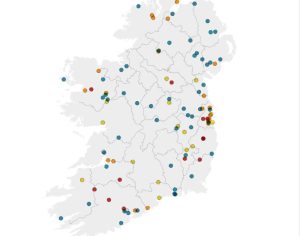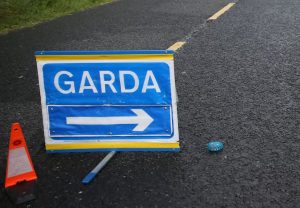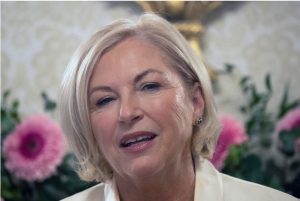Early on Sunday morning, a collision occurred on the R166 near Annagassan, close to Dunleer.
Following a traffic collision early on Sunday morning in Co Louth, a man has passed away.
The driver of one of the cars in the two-vehicle collision on the R166 at Annagassan near Dunleer was a man in his 60s.

At around 8.50 a.m. on Sunday, two cars collided, and the man was declared dead at the scene.
The woman in her 40s who was operating the other vehicle was transported by air to Mater Misericordiae University Hospital, where she is undergoing medical attention for severe injuries.
Diverts were in place, and the road remained closed on Sunday afternoon to allow for a forensic collision investigator’s examination.
The incident’s witnesses are being urged by the Gardaí to come forward, particularly if they have dash cam footage.

The chairwoman of the Road Safety Authority (RSA) maintains that the increasing number of road fatalities must be stopped by deterrence, which can only be achieved through harsher penalties and a continuous increase in road policing.
A seventy-year-old grandmother became the 100th fatality on Irish roads this year this week.
Two more people have died since Margaret Burnes was killed in a collision in County Waterford on Tuesday morning, bringing the total number of deaths this year to 102. When compared to the same time last year, there has been a 15 percent increase. In 2023, 183 people died overall, a significant increase over the 153 who died the year before.
The RSA Chairwoman, Liz O’Donnell, calls the rise in traffic deaths “heartbreaking.” RSA research indicates “there is a high degree of noncompliance” with traffic laws, she says, despite the fact that every crash is different.
Simply put, people don’t think they’ll be discovered. They also don’t fear being discovered because, even in the event that they are, the punishments aren’t too severe, and we would be willing to apply harsher sanctions.
According to her, there is still a surge in noncompliance that followed the Covid-19 pandemic, and speeding is still the leading cause of collisions.
In addition, O’Donnell notes that driving while intoxicated is becoming more and more acceptable in society, something she finds “really horrendous, having done years of advocacy” on the subject. All of this is happening against a backdrop of growing population and, with it, an increase in cars, which leads to an increase in collisions and fatalities.
She states that while enforcement is “of course an issue,” the Department of Justice and the Garda Commissioner “agree and buy-in now.”
This led to a “unprecedented directive” in April, requiring all uniformed gardaí to conduct 30 minutes of road safety policing during each shift. According to O’Donnell, this has had an impact.
In January, there were 19 reported road deaths; in February, there were 21, and in March, there were 19. The RSA credits a rise in Garda presence on the roads for the toll decline to 10 in April, 10 in May, and 15 in June. It “must be sustained,” according to O’Donnell. “You are not allowed to depress the brake in any way. The number of deaths increases the moment you do.
Eight people have already passed away in July, despite the RSA’s hopes that the decline would continue. According to O’Donnell, “you can have a day where four people are killed and suddenly, there’s a huge spike.”
The Department of Transport is currently reviewing the RSA to make sure it is still appropriate for its intended use. The RSA has come under fire recently; in April, a group of thirty road safety advocacy organisations said they had lost faith in the organisation. A number of TDs have voiced similar opinions, including Marc Ó Cathasaigh of the Green Party, Paul Murphy of People Before Profit, and Catherine Murphy of the Social Democrats.
O’Donnell disputes the accusations.

Recalling the “carnage on the roads” and 365 fatalities that year, she says, “I think it’s blaming the messenger because we are the agency that has been really successful in bringing down fatalities since 2006.”
“It was down to 192 when I was appointed in 2014, and we had 134 in 2021—the lowest number ever.”
She calls for increased government support, acknowledging that the death toll has “unfortunately” been rising.
“Maybe there was some complacency among the Government, as we were doing well in reducing fatalities,” she claims. “I hope road safety is a priority for [Taoiseach] Simon Harris, as he stated.”
Several road safety policies, such as garda access to the National Vehicle Driver File, have been shelved by one government only to resurface years later. In contrast, government plans for graduated fines for speeding were deemed “appropriate and entirely logical” by Garda Commissioner Drew Harris in 2019. The fines were never implemented.
Commissioner Harris urged the government to take action on the matter in a follow-up letter to Jack Chambers, the then-minister of state for road safety, in May. The implementation of a graduated penalty point system commensurate with the relevant offence, according to him, would discourage irresponsible driving and negative conduct on Irish roads.
According to O’Donnell, the road safety mission necessitates an all-encompassing approach from the government because it combines elements of psychology, politics, law, and communication.
Noting that “just under 1 percent” of RSA funding comes from the exchequer, she says, “I think the Government is focused now. It did take a while for us to get across the message, including that our funding model wasn’t giving us enough resources to do all the things we want to do.”
The RSA earned nearly all of its €100 million revenue in 2022, according to testimony given to the Public Accounts Committee recently. Of that, driving licence and driver test fees, NCTs, and commercial vehicle testing accounted for over €93 million. In 2022, it reported a €5.1 million surplus.
O’Donnell makes an appeal for increased State funding, claiming that the RSA’s capacity to carry out its duties has been hampered by inflation, especially in the last two years. “I think there should be no shortchanging of the RSA this year of all years, and I would hope that we get the resources we need,” she says, pointing out that the nation has budget surpluses.
She says the decline in the number of road patrol officers is unfortunate. Although she acknowledges that the decline is being addressed, she maintains that technology must be embraced in order to support gardaí in their work, as more personnel alone will not be sufficient.
“Technology has improved enforcement even this year alone,” she says, pointing out that gardaí are “confiscating cars all the time” because of a new system that removes the need to manually verify insurance information.
O’Donnell, a 15-year Progressive Democrats TD who served as a junior minister at the Department of Foreign Affairs for five of those years, calls the number of bereaved people in the last few years “heartbreaking.”
“There are a lot of people who are grieving,” she says, characterising the death of a loved one in an automobile accident as a “unique trauma” because of how abrupt, violent, and shocking it is.
O’Donnell is adamant that she will never give up on her efforts to stop the trend of rising death tolls. “I don’t get depressed; instead, I just feel motivated because I know we can succeed if everyone works together and we have enough resources,” the woman claims.
According to her, “round-the-clock” commercials promoting “killer behaviours” like speeding and drunk driving will appear in the upcoming months. With 28% of fatalities among drivers under 25, the advertisements will specifically target younger, more difficult-to-reach drivers.
“Having all of these people lose their children on the roads is just a disaster for the state of the nation, socially, economically, and emotionally,” she says.
However, a campaign like this requires funding. “In the last quarter, we invested €3 million to significantly improve our effort, visibility, and audibility,” she claims.
By 2030, O’Donnell characterises the RSA’s goal of halving the number of traffic fatalities as “legitimate – if we get back on track.”
Her longer-term goal is to attain a zero annual death toll by 2050. “Where do you find a figure? It’s an ambitious target, but even one death is unacceptable.”
Leave a Reply